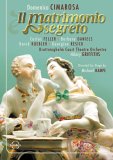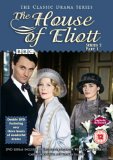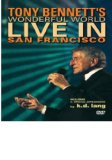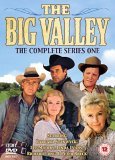![Home Town Story [1951]](/pictures/1018875.jpg) Home Town Story | DVD | (08/09/2003)
from £4.15
| Saving you £1.84 (30.70%)
| RRP
Home Town Story | DVD | (08/09/2003)
from £4.15
| Saving you £1.84 (30.70%)
| RRP Hometown Story: Released in May 1951 featuring a stunning young Marilyn Monroe on the brink of stardom. It is a rare glimpse of Monroe before her breakthrough roles in 'Niagara' and 'Gentlemen Prefer Blondes' which catapulted her to fame... and into history. Monroe plays Iris Martin a secretary whose boss is an editor of a newspaper who suspects that big business is reponsible for his recent defeat in a state legislature election. He begins a campaign against his opponent...
![Voices Of Our Time - Barbara Bonney [2001]](/pictures/1028173.jpg) Voices Of Our Time - Barbara Bonney | DVD | (23/04/2004)
from £4.01
| Saving you £17.24 (626.91%)
| RRP
Voices Of Our Time - Barbara Bonney | DVD | (23/04/2004)
from £4.01
| Saving you £17.24 (626.91%)
| RRP A Lieder recital performed by Barbara Bonney accompanied by pianist Malcolm Martineau. Recorded at the Theatre Musical De Paris Chatelet.
![Godzilla gegen Mechagodzilla [Blu-ray] [1974]](/pictures/1152943.jpg) Godzilla gegen Mechagodzilla | Blu Ray | (31/10/2019)
from £N/A
| Saving you £N/A (N/A%)
| RRP
Godzilla gegen Mechagodzilla | Blu Ray | (31/10/2019)
from £N/A
| Saving you £N/A (N/A%)
| RRP ![Brahms: Eine Deutsches Requiem [1997]](/pictures/1028579.jpg) Brahms: Eine Deutsches Requiem | DVD | (04/02/2002)
from £22.98
| Saving you £N/A (N/A%)
| RRP
Brahms: Eine Deutsches Requiem | DVD | (04/02/2002)
from £22.98
| Saving you £N/A (N/A%)
| RRP ![John Wayne - Goldstrike River [DVD] [1934]](/pictures/1096083.jpg) John Wayne - Goldstrike River | DVD | (07/09/2009)
from £N/A
| Saving you £N/A (N/A%)
| RRP
John Wayne - Goldstrike River | DVD | (07/09/2009)
from £N/A
| Saving you £N/A (N/A%)
| RRP John Wayne: Goldstrike River
 The Giant Spider Invasion | DVD | (09/05/2005)
from £N/A
| Saving you £N/A (N/A%)
| RRP
The Giant Spider Invasion | DVD | (09/05/2005)
from £N/A
| Saving you £N/A (N/A%)
| RRP Creeping!...Crawling!...Crushing! As the title suggests Giant Spiders have come to invade the earth and only two NASA employees Dr Jenny Langer and Dr. Vace can save the day!
![Billy Elliot [2000]](/pictures/1037287.jpg) Billy Elliot | DVD | (27/02/2006)
from £N/A
| Saving you £N/A (N/A%)
| RRP
Billy Elliot | DVD | (27/02/2006)
from £N/A
| Saving you £N/A (N/A%)
| RRP The winner of the audience award at this year's Edinburgh Film Festival.
 Verdi Gala -- Greatest Operatic Arias from Giuseppe Verdi | DVD | (01/01/2001)
from £N/A
| Saving you £N/A (N/A%)
| RRP
Verdi Gala -- Greatest Operatic Arias from Giuseppe Verdi | DVD | (01/01/2001)
from £N/A
| Saving you £N/A (N/A%)
| RRP In March 2001 some of the world's greatest lyric voices assembled in the cavernous Teatro Padiglione Palacassa in Parma for a Verdi Gala to commemorate the centenary of the composer's death. The works included in this concert are generally taken from his most famous operas, but there are one or two surprises too: it's not often you get the chance to hear the gorgeous "Dieu nous separe" from the Parisian grand opera Jerusalem (1847), for example, or arias from Il Corsaro (1848). The singing is mostly of a very high standard: Barbara Frittoli uses her glorious voice with intelligence in the excerpt from Il Trovatore, and Daniela Dessi is stunning in "Pace, pace" from La Forza del Destino. Older singers like Carreras and Domingo are also still on superb form, too, and both men manage to sound heavenly while packing a mighty dramatic punch. But there are also some weak links: Mariella Devia is a little too slippy-slidy in her coloratura to be a convincing Violetta, and Leo Nucci simply shouts his way through Il Trovatore. Despite the familiarity of the material, Zubin Mehta conducts with a beguiling freshness of approach and plenty of warmth and wit: the playful phrasing in "La donna e mobile" is simply charming On the DVD: Verdi Gala comes with fine picture quality, but the recording balance favours the singers over the orchestra and leaves some details of the ensemble inaudible. Each number is introduced with a personal comment from the singers, leading to some old ham from Jose Cura and some silly journalese from the others: "And thus La Traviata was born overnight", is one particularly vacuous example. The DVD also includes a slide-show of stills from the rehearsals, and subtitles in English, German, French, Spanish and Italian. --Warwick Thompson
 Il Matrimonio Segreto - Cimarosa | DVD | (31/10/2005)
from £N/A
| Saving you £N/A (N/A%)
| RRP
Il Matrimonio Segreto - Cimarosa | DVD | (31/10/2005)
from £N/A
| Saving you £N/A (N/A%)
| RRP 'Il Matrimonio Segreto' is Cimarosa's most famous opera which is reputed to have won immense admiration from Emperor Leopold II at its first performance in 1792. T Austrian Emperor liked this masterpiece so much that he ordered it to be played again from the beginning! Domenico Cimarosa's opera about the amorous bumblings of Bolognese gentry is performed by the Cologne Opera at the 1986 Schwetzingen Festival.
![Space: 1999 - Vol. 3 [1975]](/pictures/1029363.jpg) Space: 1999 - Vol. 3 | DVD | (30/04/2001)
from £N/A
| Saving you £N/A (N/A%)
| RRP
Space: 1999 - Vol. 3 | DVD | (30/04/2001)
from £N/A
| Saving you £N/A (N/A%)
| RRP For the time, there had never been a more lavishly produced science fiction TV series than Space: 1999, which was British-made on a first-season budget of 3.25 million pounds--an astounding amount--and ran for two seasons from 1975 to 77. What keeps fans enthralled after all these years has only partly to do with the first-rate production values, the plausibly constructed spaceship models and expert special effects. The tone of the show is one of scientific dispassion, setting it apart from its TV SF predecessors such as Star Trek in which the mood is more generally convivial. Our heroes here are in dire circumstances that require cool heads as a survival trait. Those circumstances are: the moon and the 311 crew members of Moonbase Alpha experience a cataclysm that causes the moon to break away from its orbit and travel endlessly through space, making our heroes into unintentional explorers. No TV series has created a more palpable feel of hard science fiction than this. Of course the show is not without its detractors, having been soundly lambasted for its many scientific errors. No less august a figure than Isaac Asimov criticised the show for its premise in the opening episode "Breakaway", which had nuclear explosions on the "dark side of the moon" somehow propel it out of orbit and sent it flying through space without regard for any physical laws. In "Earthbound", aliens travelling to Earth state it will take them 75 years to reach their destination, making one wonder why it didn't take the moon that long to encounter the aliens. While these are serious complaints, fans tend to remember the scientific seriousness of the series and the sense of awe created by the many strange creatures and phenomena they encounter on their journey through the galaxy. --Jim Gay, Amazon.com
![The King And Four Queens [DVD]](/pictures/1140013.jpg) The King And Four Queens | DVD | (23/02/2015)
from £6.99
| Saving you £6.00 (85.84%)
| RRP
The King And Four Queens | DVD | (23/02/2015)
from £6.99
| Saving you £6.00 (85.84%)
| RRP Rauol Walsh's humorous western stars Clark Gable as fugitive Dan Kehoe, who is hiding out in a small ghost town where the only remaining inhabitants are the female members of the notorious outlaw McDade family: matriarch Ma MacDade (Jo Van Fleet) and the four young wives (played by Eleanor Parker, Jean Willes, Barbara Nichols and Sara Shane) of Mrs McDade's gunslinging sons, three of whom have been reported dead. The fourth son is expected to return home at any moment with the spoils of a recent stagecoach robbery, but as no one knows which of the four sons is still alive, all four wives turn their attention to the bemused Kehoe - and he in turn responds to their advances, hoping to get a share of the gold.
 The House Of Eliott - Series 2 - Vol. 1 | DVD | (09/01/2006)
from £10.09
| Saving you £9.90 (98.12%)
| RRP
The House Of Eliott - Series 2 - Vol. 1 | DVD | (09/01/2006)
from £10.09
| Saving you £9.90 (98.12%)
| RRP The House of Eliott is now the smartest most prestigious establishment in London and the Eliott sisters have to contend with the pressures of running their empire as well as the problems in their private lives. Beatrice's devotion to the business puts a tremendous strain on her marriage while Evie embarks upon a liaison which threatens to ruin both her life and the House of Eliott. Episode 1 The sisters are both offered a job by gilles Caranac who has just impressed them
![Rings on Their Fingers Complete [DVD]](/pictures/1117076.jpg) Rings on Their Fingers Complete | DVD | (03/09/2012)
from £N/A
| Saving you £N/A (N/A%)
| RRP
Rings on Their Fingers Complete | DVD | (03/09/2012)
from £N/A
| Saving you £N/A (N/A%)
| RRP Take a step back in time to 1970s England. The full force of Women's Lib hadn't quite filtered through to suburbia; Margaret Thatcher had yet to take over Number 10; and while living together wasn't the sin it once was - and women were free to both work and run the home - a girl still wanted a ring on her finger. At least this girl did.Sandy has started dropping hints to Oliver that she would rather be married than go on living together, and thus begins a hit comedy series that would run for three hilarious series.From birthdays and anniversaries, through wedding plans - both on or off - old flats that need repair, new flats that need furnishing, holidays away and dinners at home; for Sandy and Oliver nothing is as simple as it should be when a couple living happily together suddenly find themselves with Rings on their Fingers.This release features the Complete Series One to Three and the 1978 Christmas Special.
 Tony Bennett - An American Classic | DVD | (23/04/2007)
from £8.62
| Saving you £-0.63 (N/A%)
| RRP
Tony Bennett - An American Classic | DVD | (23/04/2007)
from £8.62
| Saving you £-0.63 (N/A%)
| RRP Acclaimed director Rob Marshall re-invents the traditional variety special in this groundbreaking event with show-stopping dance numbers and breathtaking stage production. Marshall and his Academy-award-winning creative team take the viewer on an emotional musical journey re-creating seminal venues of Tony Bennett's music career from the 52nd Street Swing Club to the early Columbia recording studio from the ""rat pack"" stage in Las Vegas to the famous Carnegie Hall. Tony performs live duets of his greatest hits with the greatest artists of today. The show features special appearances by Robert De Niro Catherine Zeta-Jones John Travolta Bruce Willis and Billy Crystal! Track Listing 1. Smile - with Barbra Streisand 2. Sing You Sinners - with John Legend 3. Because of You - with K.D.Lang (featuring Chris Botti) 4. The Best Is Yet to Come - with Diana Krall 5. The Shadow of Your Smile - with Juanes 6. Rags to Riches - with Elton John 7. Just in Time - with Michael Buble 8. For Once in My Life - with Stevie Wonder 9. Steppin' Out - with Christina Aguilera 10. I Left My Heart in San Francisco
![Two Evil Eyes [Blu-ray]](/pictures/1155421.jpg) Two Evil Eyes | Blu Ray | (29/10/2019)
from £N/A
| Saving you £N/A (N/A%)
| RRP
Two Evil Eyes | Blu Ray | (29/10/2019)
from £N/A
| Saving you £N/A (N/A%)
| RRP ![The Lucky Texan [1934]](/pictures/1002327.jpg) The Lucky Texan | DVD | (11/08/2003)
from £N/A
| Saving you £N/A (N/A%)
| RRP
The Lucky Texan | DVD | (11/08/2003)
from £N/A
| Saving you £N/A (N/A%)
| RRP Jerry Mason (Wayne) and his partner strike it rich but tragedy ensues when one is accused of murder...
![Cracker - The Big Crunch [1994]](/pictures/1048415.jpg) Cracker - The Big Crunch | DVD | (16/10/2006)
from £10.98
| Saving you £4.00 (44.49%)
| RRP
Cracker - The Big Crunch | DVD | (16/10/2006)
from £10.98
| Saving you £4.00 (44.49%)
| RRP An illicit rendezvous discovered in a park initially appears to be a clear case of adultery but on closer inspection a darker picture develops. A man abuses his position of trust to recruit young girls into his religious sect. Morality is turned on its head when an innocent young girl is 'punished' for the wrong doings of her 'priest'. Bearing all the symbolism of the serpent rearing its ugly head in the Garden of Eden a world of religious fanaticism hypocrisy and perversity unfolds. Appearances can be deceptive as Fitz attempts to unearth the most sinister truths behind the religious faade with spine-chilling consequences.
 The Big Valley - Series 1 | DVD | (16/10/2006)
from £N/A
| Saving you £N/A (N/A%)
| RRP
The Big Valley - Series 1 | DVD | (16/10/2006)
from £N/A
| Saving you £N/A (N/A%)
| RRP This eight disc box set features all 30 episodes of the first series of The Big Valley a lavish western drama starring one of Hollywood's greatest female stars Barbara Stanwyck. This action-filled Western adventure was set on the Barkley ranch in California's San Joaquin Valley in the 1870s.
 Family At War A - Series 2 - Part 3 | DVD | (07/03/2005)
from £18.91
| Saving you £1.08 (5.71%)
| RRP
Family At War A - Series 2 - Part 3 | DVD | (07/03/2005)
from £18.91
| Saving you £1.08 (5.71%)
| RRP After everyone thought he was 'missing presumed dead' John Porter is found alive albeit disorientated and distant. Margaret has to contend with his unpleasant mother and make an agonising decision.
 The House Of Eliott - Series 2 - Vol. 2 | DVD | (06/02/2006)
from £N/A
| Saving you £N/A (N/A%)
| RRP
The House Of Eliott - Series 2 - Vol. 2 | DVD | (06/02/2006)
from £N/A
| Saving you £N/A (N/A%)
| RRP The House Of Eliott continues with its reputation as the most elegant couture house in London and the Eliott sisters juggle with running their empire keeping the workroom seamstress happy and the bank at bay. Evie meets Lord Alexander Monford at Montford Hall and there is instant chemistry between them. Episode 5: The sisters are designing the costumes for a new abstract ballet and the workroom girls are excitedly making Till's wedding dress. A financial problem results in a

Please wait. Loading...
This site uses cookies.
More details in our privacy policy